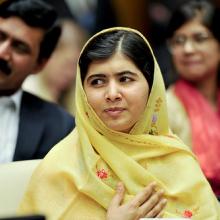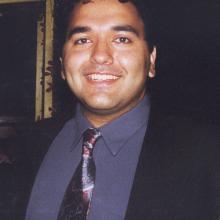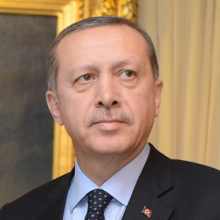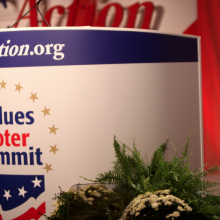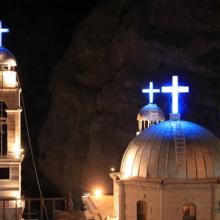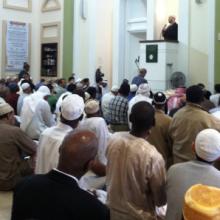Islam
A public opinion war on Middle East politics is playing out this spring in new advertising campaigns on public buses and in newspapers.
It began when the American Muslims for Palestine (AMP) launched bus ads during the April Cherry Blossom Festival condemning U.S. aid to Israel because of that country’s continuing occupation of Palestinian territories.
Then on Monday, Pamela Geller’s American Freedom Defense Initiative countered by deploying 15-foot-long ads on 20 buses in the Washington, D.C., system that equate opposition to Israel’s policies with Nazism. One ad shows the grand mufti of Jerusalem meeting Hitler during World War II.
“The bus system is considered public space, so speech has First Amendment protections,” said Caroline Laurin, a spokeswoman for the Washington Metropolitan Area Transit Authority. “We have no grounds to refuse ads due to their content.”
On April 15, terrorists from Boko Haram abducted more than 200 Nigerian girls sleeping in their high school dormitory. The girls awoke to a nightmare of violent gunfire as the terrorists forced them into their vehicles and vanished.
Recently the leader of Boko Haram has garnered media attention with his video arrogantly taking credit for the kidnapping. He added a religious element to his repulsive actions:
“I abducted your girls. I will sell them in the market, by Allah. There is a market for selling humans. Allah says I should sell. He commands me to sell. I will sell women.”
Omid Safi, professor of Islamic Studies at the University of North Carolina at Chapel Hill, wrote an impassioned response to Boko Haram’s leader that speaks for me: “Human beings are not for sale…This is the bastardization of Islam, of decency, of liberation, of all that is good and beautiful.”
IS IT WRONG for a Christian to pray to Allah? When a Muslim worships Allah, is she worshiping God?
Questions like these have arisen with more urgency than usual in the months since a Malaysian lower court ruled in October that the word “Allah” was exclusive to Muslims and therefore the Herald, a Malay Catholic newspaper, could not use the word “Allah” in print. (The decision is currently under appeal.)
Many Christians lament the lower court’s decision. They see it as an infringement on the rights of religious minorities. But other Christians welcome the ruling. They claim that it actually helps Malaysian Christians by protecting them from confusion and preventing them from making a grave mistake.
For example, Albert Mohler, president of Southern Baptist Theological Seminary here in the U.S., has argued that Christians should not call upon the God of the Bible using the word “Allah,” because “Allah” refers only to the god of the Quran, a god who is radically different from the true God of Jesus Christ.
Whether Mohler and those who agree with him are right carries dramatic implications. If they are, then prospects for respectful, trusting cooperation between Christians and Muslims are slim. There is one and only one God. If Christians believe that Muslims do not worship that God, then we must believe that Muslims worship nothing, an empty, created idol, or else something demonic. The claim to worship the one and only God is one of the most central claims of Islam. No matter how respectfully a Christian denied that claim, it would be difficult for most Muslims to receive that rejection. Mutual respect is an important ingredient in public cooperation. Thus cooperation between Christians and Muslims would be impeded. Even more disconcertingly, if the bulk of Christians held, as some do now, that Muslims actually worship a demonic force, then those Christians would have compelling reasons not to cooperate with Muslims. To do so would be to cooperate in opposition to God.
Foreign law bans are back.
For the fourth year running, Florida is trying to outlaw the use of foreign and international law in state courts. Missouri has mounted another attempt to pass an anti-foreign law measure after last year’s effort was vetoed by Gov. Jay Nixon. The bans also have crept farther north, making a debut in Vermont.
These laws, which have passed in seven states, are the brainchild of anti-Muslim activists bent on spreading the illusory fear that Islamic laws and customs (also known as Shariah) are taking over American courts. This fringe movement shifted its focus to all foreign laws after a federal court struck down an Oklahoma ban explicitly targeting Shariah as discriminatory toward Muslims.
The old city of Jerusalem is smaller than one square mile. In 5,000 years of recorded human history there have been 180 conflicts around the city. It has been conquered 44 times, and completely destroyed twice. The story of conflict in this city is clearly not a new story.
When the producers of Jerusalem, a new movie for IMAX and other giant screen theaters, decided to approach the topic, they wanted to bring a fresh perspective to the long history.
“Jerusalem is a city in conflict,” said Taran Davies, one of the producers of Jerusalem, at a recent screening of the movie. “We wanted a new way to think about it. This [movie] is more a celebration.”
American Jews say they face discrimination in the U.S., but they see Muslims, gays, and blacks facing far more.
This and other findings from the recently released Pew Research Center’s landmark study on Jewish Americans help make the case that Jews — once unwelcome in many a neighborhood, universitym, and golf club — now find themselves an accepted minority.
“While there are still issues, American Jews live in a country where they feel they are full citizens,” said Kenneth Jacobson, deputy national director of the Anti-Defamation League, which was founded in 1913 to combat anti-Semitism.
Sojourners supports the National Religious Campaign Against Torture (NRCAT). NRCAT recently released five Youtube videos to counter the claims found in pop-culture that torture is acceptable. Check out this video of people of faith speaking to core faith values that underlie their anti-torture work,, which features Sojourners' Lisa Sharon Harper.
Malala Yousafzai has captured our love and imagination.
Malala was recently a guest on the Daily Show with Jon Stewart. By the end of the interview, Stewart was so enamored with Malala that he asked if he could adopt her. The remark was hilarious because it was true. After 5 minutes with this girl, who wouldn’t want to adopt her?
Malala is the 16-year-old Pakistani girl who fought for education in the face of persecution from the Taliban. She explained on the show that, “Education is the power for women and that’s why the terrorists are afraid of education. They do not want women to get education because then women would become more powerful.”
In the face of persecution from the Taliban, Malala says she “spoke on every media channel I could and I raised my voice on every platform that I could and I said, ‘I need to tell the world what is happening in Swat and I need to tell the world that Swat is suffering from terrorism and we need to fight against terrorism.’”
But it was what she said next that stole our hearts. She reflected upon what she would do if a member of the Taliban came to take her life.
If you hit a Talib … then there would be no difference between you and the Talib. You must not treat another with that much cruelty and that much harshly. You must fight others, but through peace and through dialogue and through education. Then I’ll tell him how important education is and that I even want education for your children as well. And I’ll tell him, ‘That’s what I want to tell you. Now do what you want.’
MARTIN LUTHER KING JR. once said that the greatest Christian of the 20th century was not a member of the church. He was referring to Mohandas Gandhi. A remarkable number of King’s fundamental beliefs—the use of active nonviolence as a tool of social reform, the commitment to loving one’s enemies—can be traced back to the influence of Gandhi, which means that one of the defining figures of 20th century American Christianity was profoundly shaped by the example of an Indian Hindu. As King said in 1958 of the civil rights movement, “Christ furnished the spirit and motivation while Gandhi furnished the method.”
But what of Gandhi’s influences? How did a skinny, middle-class, mid-caste Indian, so scared of public speaking as a student that a classmate had to read his speeches aloud for him, come to lead one of the great liberation struggles of the past century? A new book by Arvind Sharma, professor of comparative religions at McGill University, makes the case that the source of Gandhi’s strength was his spirituality. And while the heart of Gandhi’s faith was Hindu, as King’s was Baptist, the influences were remarkably diverse.
Pointing out that most of the biographies of Gandhi really tell the story of Mohandas Karamchand (the name he was given by his family), not Mahatma (a title that means “great soul” and is given to saints in India), Sharma’s book Gandhi: A Spiritual Biography sets out to give an account of the Mahatma. Sharma quotes Gandhi directly on the importance of highlighting the dimension of spirituality in any attempt to understand him: “What I want to achieve—what I have been striving and pining to achieve these 30 years—is self-realization, to see God face to face, to attain moksha [the Hindu term for liberation]. I live and move and have my being in pursuit of this goal.”
Pakistan’s constitutionally mandated Council of Islamic Ideology told the government anyone who wrongly accuses a person of blasphemy against Islam must be executed — a measure intended to protect innocent people who are often killed by mobs.
The CII demanded the measure after endorsing Pakistan’s blasphemy laws, which allow a death sentence for people found guilty of desecrating the Quran, the Prophet Muhammad, mosques, or Islamic beliefs.
Islamophobic or empowering? Those are among the reactions to a new Diesel jeans ad featuring a heavily tattooed, topless white woman wearing a redesigned, denim burqa.
The slogan next to her: “I Am Not What I Appear To Be.”
Racist and condescending are among the criticisms that have been leveled at the ad, created by Nicola Formichetti, former stylist to Lady Gaga, who made waves last month with her song “Burqa.” But others, including a female Muslim marketing consultant who advised Diesel, said the idea was to make people question assumptions and stereotypes.
Muslim stand-up comedy is nothing new. But what makes “The Muslims Are Coming” different is that it portrays what happens when a troupe of comedians performs before red state Americans in such places as Tennessee, Georgia, Alabama, Mississippi, Florida, Arizona, Utah and Idaho.
The documentary by Negin Farsad, an Iranian-American, and Dean Obeidallah, of Palestinian-Italian roots, opened in Chicago yesterday.
It’s been five years now that Talat Hamdani has been able to talk about her son without crying, but she still prefers mostly not to tell his story.
“It’s all over the Internet,” she said.
She’s stopped talking about how she initially didn’t worry when her son, Mohammad Salman Hamdani, who was a cadet with the New York City Police Department, didn’t answer his cellphone that night; about how police questioned her and her husband when authorities couldn’t find their son’s body, to see if he had any terrorist connections; about the New York Post headline a month after the attacks — “Missing – Or Hiding? – Mystery Of NYPD Cadet From Pakistan,” that cast him as a suspect in the 9/11 attacks.
Three years ago, a nobody from nowhere got famous for doing something unpleasant.
The self-ordained pastor of an unknown Florida church threatened to burn a Quran. And then he did it. And then others with their own intentions picked up the story and used it to inflame Muslims in several nations.
The result: At least 50 people were killed, including seven United Nations employees.
Now that nobody is back, threatening to burn 3,000 Qurans on Wednesday as a “memorial” to the victims of the 9/11 attacks.
You may have noticed I’ve not named the man. That’s not an accident. Publicity is what he wants and I had decided that my small protest against him would be to not contribute to it. While I defend his legal right to do this, nobody needs to add to his spotlight.
And then I heard about a planned counterdemonstration by a Muslim interfaith activist, Mike Ghouse, who’s been plugging away at his cause for years. This year he’s bringing his 10th annual “Unity Day USA” to the same Florida town where the pastor has threatened to burn the Qurans.
“The mosques are our barracks, the domes our helmets, the minarets our bayonets and the faithful our soldiers.”
This was the Islamist poem quoted by the mayor of Istanbul, Turkey, in December 1997. Charged with using inflammatory speech, he was ejected from office and sentenced to jail by the Ankara High Court.
Today, that mayor, Recep Tayyip Erdogan, is prime minister of Turkey. During a decade in office, he has slowly but inexorably pushed secular Turkey, a member of NATO, toward an unabashedly Islamist future.
As a Muslim, I refuse to give up Islam to the Islamists. So should others who believe in a deeply pluralistic Islam of the sort my Indian-born grandparents taught. It is the only path to peaceful resolution of inevitable religious differences, within Islam and with other faiths.
Yet today pluralist manifestations of Islam are contracting. Never before has there been a time when Islam has been more threatened from within. That threat today is twofold: ideological and sectarian.
Christian conservatives who think Satan is using communism and Islam to bring down America can add a new “adversary” to the list: the Emergent Church movement.
A portion of the upcoming Values Voter Summit in Washington will stray from its usual focus on politics and consider the Emergent Church as one of three “channels the adversary is using to bring America down.” Art Ally, president of The Timothy Plan, a Florida-based mutual fund company devoted to “biblically responsible investing,” will lead the breakout session.
“Why would Satan use Communism? It’s a godless form of government,” said Ally. “Why would Satan use Islam? Same reason. It’s not a religion. It’s a movement to dominate the world under the guise of religion. The Emergent Church plays right into that by weakening further our church community.”
As Syrian President Bashar al-Assad uses chemical weapons at the outskirts of Damascus and President Obama mulls a U.S. military response, some theologians hope for an alarming endgame to the 30-month-long Syrian conflict.
For these Christians and Muslim, the civil war in Syria heralds nothing less than the Second Coming of Jesus Christ.
Before you label the premise as a conspiracy theory, consider that there are a number of Muslim videos and several Christian websites — not to mention conservative talk radio shows — all making promoting versions of this unfortunate connection. And that’s wrong.
North Carolina became the seventh state to prohibit its judges from considering Islamic law after Gov. Pat McCrory allowed the bill to become law without formally signing it.
McCory, a Republican, called the law “unnecessary,” but declined to veto it. The bill became law on Sunday.
The state joins Arizona, Kansas, Louisiana, Oklahoma, South Dakota, and Tennessee.
Supporters hailed the bill as an important safeguard that protects the American legal system from foreign laws that are incompatible with the U.S. Constitution, while critics argued that the bill’s only purpose is to whip-up anti Muslim hatred because the Constitution already overrides foreign laws.
He’s born poor. By age 6, he’s an orphan. Two years later, he loses his grandfather. Yet he overcomes his circumstances, develops a reputation for business integrity and progressive views on marriage.
Then he becomes a prophet of God.
The portrait of the Muslim prophet, which emerges from a PBS documentary “Life of Muhammad,” may surprise some American viewers.
In their holiday Eid al-Fitr khutbas, or sermons, on Thursday many imams across the country noted a growing climate of acceptance in America but urged Muslims not to forget the problems facing their communities in the U.S. and overseas.
“The Eid khutba is like the State of the Union address,” said Oklahoma-born convert Suhaib Webb, imam of the Islamic Society of Boston Cultural Center, the biggest mosque in New England, to an overflowing crowd — men dressed in crisp robes, tunics, and three-piece suits, women in black abayas, long floral wraps, and colorful headscarves.
“Our community is at a unique crossroads,” Webb said, issuing a call for older Muslim generations to allow younger generations to have greater roles in community affairs. “There are a lot of young people with a lot of excitement, and a lot of old people with a lot of fear. And that’s not a healthy thing.”






